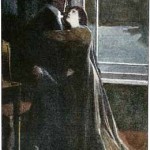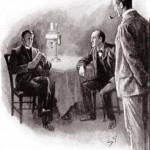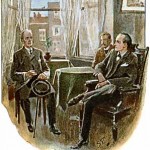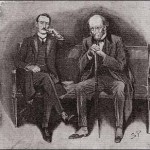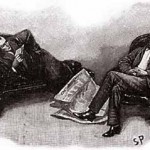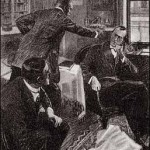At half-past twelve we found ourselves upon the steps of Mrs. Warren’s house–a high, thin, yellow-brick edifice in Great Orme Street, a narrow thoroughfare at the northeast side of the British Museum. Standing as it does near the corner of the street, it commands a view down Howe Street, with its more pretentious houses. Holmes pointed with a chuckle to one of these, a row of residential flats, which projected so that they could not fail to catch the eye.
“See, Watson!” said he. “‘High red house with stone facings.’ There is the signal station all right. We know the place, and we know the code; so surely our task should be simple. There’s a ‘to let’ card in that window. It is evidently an empty flat to which the confederate has access. Well, Mrs. Warren, what now?”
“I have it all ready for you. If you will both come up and leave your boots below on the landing, I’ll put you there now.”
It was an excellent hiding-place which she had arranged. The mirror was so placed that, seated in the dark, we could very plainly see the door opposite. We had hardly settled down in it, and Mrs. Warren left us, when a distant tinkle announced that our mysterious neighbour had rung. Presently the landlady appeared with the tray, laid it down upon a chair beside the closed door, and then, treading heavily, departed. Crouching together in the angle of the door, we kept our eyes fixed upon the mirror. Suddenly, as the landlady’s footsteps died away, there was the creak of a turning key, the handle revolved, and two thin hands darted out and lifted the tray from the chair. An instant later it was hurriedly replaced, and I caught a glimpse of a dark, beautiful, horrified face glaring at the narrow opening of the box-room. Then the door crashed to, the key turned once more, and all was silence. Holmes twitched my sleeve, and together we stole down the stair.
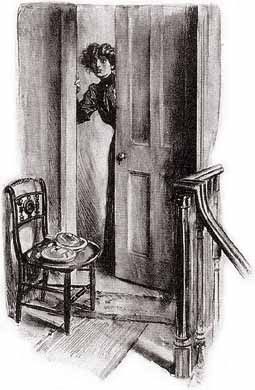
“I will call again in the evening,” said he to the expectant landlady. “I think, Watson, we can discuss this business better in our own quarters.”
“My surmise, as you saw, proved to be correct,” said he, speaking from the depths of his easy-chair. “There has been a substitution of lodgers. What I did not foresee is that we should find a woman, and no ordinary woman, Watson.”
“She saw us.”
“Well, she saw something to alarm her. That is certain. The general sequence of events is pretty clear, is it not? A couple seek refuge in London from a very terrible and instant danger. The measure of that danger is the rigour of their precautions. The man, who has some work which he must do, desires to leave the woman in absolute safety while he does it. It is not an easy problem, but he solved it in an original fashion, and so effectively that her presence was not even known to the landlady who supplies her with food. The printed messages, as is now evident, were to prevent her sex being discovered by her writing. The man cannot come near the woman, or he will guide their enemies to her. Since he cannot communicate with her direct, he has recourse to the agony column of a paper. So far all is clear.”
“But what is at the root of it?”
“Ah, yes, Watson–severely practical, as usual! What is at the root of it all? Mrs. Warren’s whimsical problem enlarges somewhat and assumes a more sinister aspect as we proceed. This much we can say: that it is no ordinary love escapade. You saw the woman’s face at the sign of danger. We have heard, too, of the attack upon the landlord, which was undoubtedly meant for the lodger. These alarms, and the desperate need for secrecy, argue that the matter is one of life or death. The attack upon Mr. Warren further shows that the enemy, whoever they are, are themselves not aware of the substitution of the female lodger for the male. It is very curious and complex, Watson.”
“Why should you go further in it? What have you to gain from it?”
“What, indeed? It is art for art’s sake, Watson. I suppose when you doctored you found yourself studying cases without thought of a fee?”
“For my education, Holmes.”
“Education never ends, Watson. It is a series of lessons with the greatest for the last. This is an instructive case. There is neither money nor credit in it, and yet one would wish to tidy it up. When dusk comes we should find ourselves one stage advanced in our investigation.”

